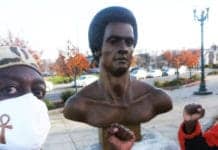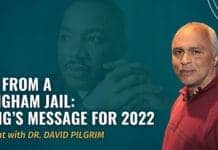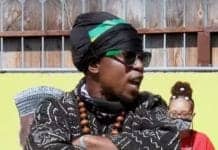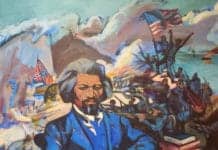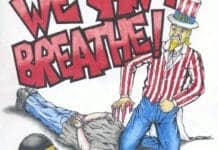by Kheven LaGrone
Last month, the U. S. Supreme Court listened to arguments on same-sex marriage. The events reminded me of Frederick Douglass’ 1865 essay titled “What the Black Man Wants.” He wrote:
 “There is something too mean in looking upon the Negro, when you are in trouble, as a citizen, and when you are free from trouble, as an alien. When this nation was in trouble, in its early struggles, it looked upon the Negro as a citizen. In 1776 he was a citizen. At the time of the formation of the Constitution, the Negro had the right to vote in eleven States out of the old thirteen. In your trouble you have made us citizens. In 1812, Gen. Jackson addressed us as citizens – ‘fellow-citizens.’ He wanted us to fight. We were citizens then! And now, when you come to frame a conscription bill, the Negro is a citizen again. He has been a citizen just three times in the history of this government, and it has always been in time of trouble.”
“There is something too mean in looking upon the Negro, when you are in trouble, as a citizen, and when you are free from trouble, as an alien. When this nation was in trouble, in its early struggles, it looked upon the Negro as a citizen. In 1776 he was a citizen. At the time of the formation of the Constitution, the Negro had the right to vote in eleven States out of the old thirteen. In your trouble you have made us citizens. In 1812, Gen. Jackson addressed us as citizens – ‘fellow-citizens.’ He wanted us to fight. We were citizens then! And now, when you come to frame a conscription bill, the Negro is a citizen again. He has been a citizen just three times in the history of this government, and it has always been in time of trouble.”
During the gay marriage controversy, the nation “looked upon the Negro as a citizen.” Both sides used African Americans as props. A pro-gay marriage attorney argued that banning gay marriage was the same as banning interracial marriage in the past. One of the justices challenged his comparison by pointing out that interracial relationships have been visible around the world for centuries.
Media coverage repeatedly referred to the gay marriage movement as another civil rights movement. They often used the term “marriage equality” rather than gay marriage – a play on the phrase “racial equality.” Any opposition to gay marriage – or “marriage equality” – risked being labeled “hatred,” “bigotry” and “discrimination.” Gay marriage advocates even brought up the 14th Amendment to the Constitution that was specifically written to protect the rights of newly-freed Blacks after the Civil War.
The media covered rallies outside the Supreme Court – both pro-gay marriage and in defense of traditional marriage. The traditional marriage rally organizers “looked upon the Negro” by pulling out African American spokespersons to counter the racialization of the gay marriage debate. For them, simply replacing the adjective “racial” with “gay” did not prove the struggles were similar. They found it trivialized the African American civil rights struggles, and it was offensive.
Trivializing the African American struggles against discrimination can be offensive. For example, Oakland African Americans have alarming murder, HIV and unemployment rates. Yet when a group “struggled” to have a “doggy play” park built at Lake Merritt, a white women argued that she was “discriminated” against because she lived near Lake Merritt and she had no place for her dog to play. Another white lady facetiously joined the debate in a cat costume. She opposed the dog park because it discriminated against cats.
The Supreme Court is expected to make decisions concerning gay marriage in June 2013. After the decision is made and the gay marriage issue fades away, I wonder if the nation will once again, as Frederick Douglass wrote, “look upon the Negro […] as an alien.”
I read the anonymous racial comments on SFGate.com on various topics. If these comments reflect America, then we do not live in a colorblind society. A “post-racial” America is our fool’s paradise. Thus, African Americans will have to ask ourselves questions: Will the gay marriage debate further equality for African Americans – straight or gay? Will African American gay men no longer have to complain about feeling unwelcome in the Castro?
Will the many Americans stop justifying angry white men killing African American teenagers? Will the white gay media return to the days when Black couples did not appear in their ads? After arguing to prove racial inequality, will more Americans justify affirmative action for African Americans?
Kheven LaGrone, writer, artist and curator of “Coloring Outside the Lines: Black Cartoonists as Social Commentators” and many other acclaimed exhibits, can be reached at khevan@aol.com .

 Store
Store



